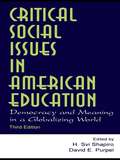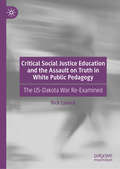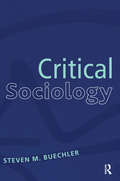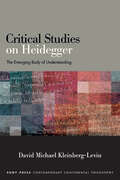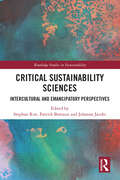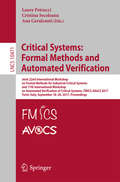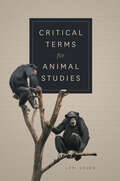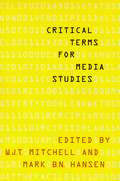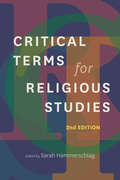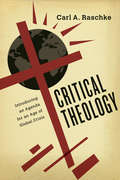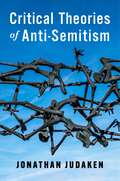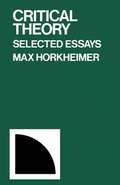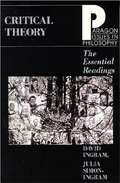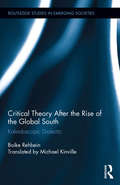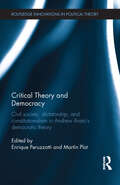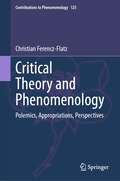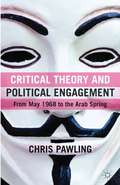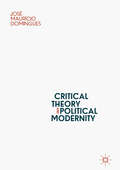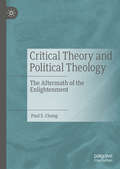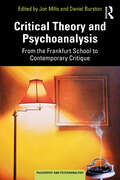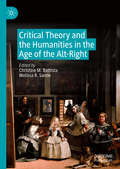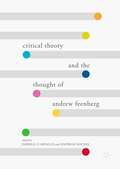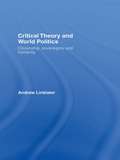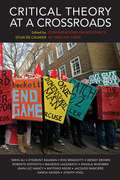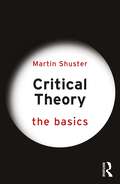- Table View
- List View
Critical Social Issues in American Education: Democracy and Meaning in a Globalizing World
by H. Svi Shapiro David E. PurpelThis text-reader brings together powerful readings that critically situate issues of education in the context of the major cultural, moral, political, economic, ecological, and spiritual crises that confront us as a nation and a global community. It provides a focus and a conceptual framework for thinking about education in light of these issues. Readers are exposed to the thinking of some of the best and most insightful social and educational commentators. Critical Social Issues in American Education: Democracy and Meaning in a Globalizing World, Third Edition, is intended to work on two levels. First, it helps readers to develop an awareness of how education is connected to the wider social structures of cultural, political, and economic life. Second, it encourages not only a critical examination of our present social reality but also a serious discussion of alternatives--of what a transformed society and educational process might look like. The editors' goal is to deliberately engage readers in connecting the work of teachers to an ethically committed, politically charged pedagogy. The assumption on which they base the text is that educators must see their work as inextricably linked to the broader conflicts, stresses, and crises of the social world--it is not otherwise possible to make sense of what is happening educationally. What happens in school, or as part of the educational experience, reflects, expresses, and mediates profound questions about the direction and nature of the society we inhabit. The text is organized thematically into five sections, which address, respectively, social justice and democracy; consumerism, culture, and public education; marginality and difference; moral and spiritual perspectives on education; and globalization and education. Each section is preceded by a brief essay that introduces the readings. This Third Edition includes many new readings and addresses issues that have more recently emerged as especially significant--such as concerns about the implications of globalization and the post 9/11 world, commercialism, violence, and the ever-increasing influence of high stakes testing. This compelling text is relevant for a wide range of courses in educational foundations, educational policy, curriculum studies, and multicultural education that address the social context of education, cultural and political change, and public policy.
Critical Social Justice Education and the Assault on Truth in White Public Pedagogy: The US-Dakota War Re-Examined
by Rick LybeckThis book explores tensions between critical social justice and what the author terms white justice as fairness in public commemoration of Minnesota’s US-Dakota War of 1862. First, the book examines a regional white public pedagogy demanding “objectivity” and “balance” in teaching-and-learning activities with the purpose of promoting fairness toward white settlers and the extermination campaign they once carried out against Dakota people. The book then explores the dilemmas this public pedagogy created for a group of majority-white college students co-authoring a traveling museum exhibit on the war during its 2012 sesquicentennial. Through close analyses of interviews, field notes, and course artifacts, this volume unpacks the racial politics that drive white justice as fairness, revealing a myriad of ways this common sense of justice resists critical social justice education, foremost by teaching citizens to suspend moral judgment toward symbolic white ancestors and their role in a history of genocide.
Critical Sociology
by Steven M. BuechlerAll sociology is implicitly critical because the sociological perspective questions and debunks what common sense takes for granted. Some sociology is explicitly critical of how the domination of states, corporations, the media, and other powerful institutions attenuate our potential for living autonomous lives in today's world. In Critical Sociology, Buechler explores sociology's double critique. The book opens with chapters on how to think sociologically; an overview of the scientific, humanistic, and critical schools of sociology; and a more detailed exposition of the critical tradition. He applies this critical tradition to economics, politics, and culture; to class, race, and gender; to individualism, self, and identity; and to globalization, social movements, and democracy.
Critical Studies on Heidegger: The Emerging Body of Understanding (SUNY series in Contemporary Continental Philosophy)
by David Michael Kleinberg-LevinIn these boldly original studies, Heidegger's thought is carried critically and constructively beyond its original limitations, re-presenting his project in terms of an emerging body of understanding, making sense of this project not only in its historical, cultural significance but also in its bearing on the emergence of future possibilities. Continuing Heidegger's commitment to a way of thinking that is formed from reflectively lived experience, David Michael Kleinberg-Levin suggests what can be learned regarding the character of our typical and habitual ways of looking and seeing, hearing and listening, and touching, holding, handling, and gesturing. The body of ontological understanding consequently emerges as we learn how to take responsibility for the meaning of being in forming and developing the character of our relationship to all the beings in our world. In this original reading of Heidegger's thought, Kleinberg-Levin suggests what his project could mean for an ethical way of life.
Critical Sustainability Sciences: Intercultural and Emancipatory Perspectives (Routledge Studies in Sustainability)
by Stephan Rist Patrick Bottazzi Johanna JacobiThis book explores Critical Sustainability Sciences, a new field of scientific inquiry into sustainability issues. It builds on a highly novel integration of elements from relational ontologies, critical theory, political ecology, and intercultural philosophy in support of emancipatory perspectives on sustainability and development. The book Critical Sustainability Sciences begins by uncovering the weaknesses of mainstream sustainability science and debates on sustainable development. The new field of Critical Sustainability Sciences has grown out of a deep engagement with relational ontologies, which helps to overcome the dualist ontology underlying mainstream notions of sustainability and development. Dualist ontologies reinforce problematic anthropocentric divisions, for example, between humans and nature, subjects and objects, mind and matter, body and soul, etc. Examples from indigenous peoples in Bolivia, India, and Ghana – as well as integrative movements in Chile, Brazil, and Europe – show that relational conceptions of life, rooted in ecosophy and cosmosophy, can provide an intercultural philosophical foundation for Critical Sustainability Sciences. The book concludes by describing three key topics for exploration in Critical Sustainability Sciences: societal reorganization in view of emancipatory, existential, and cognitive self-determination; living labor and commons; and the development of new comprehensive relational scientific paradigms. This book will be of great interest to students, scholars, and practitioners of emancipatory and intercultural approaches to sustainability and development.
Critical Systems: Joint 22nd International Workshop on Formal Methods for Industrial Critical Systems and 17th International Workshop on Automated Verification of Critical Systems, FMICS-AVoCS 2017, Turin, Italy, September 18–20, 2017, Proceedings (Lecture Notes in Computer Science #10471)
by Laure Petrucci Cristina Seceleanu Ana CavalcantiThis book constitutes the refereed proceedings of the Joint 22nd International Workshop on Formal Methods for Industrial Critical Systems and the 17th International Workshop on Automated Verification of Critical Systems, FMICS-AVoCS 2017, held in Turin, Italy, in September 2017. The 14 full papers presented together with one invited talk were carefully reviewed and selected from 30 submissions. They are organized in the following sections: Automated verification techniques; Testing and scheduling; Formal Methods for mobile and autonomous robots; and Modeling and analysis techniques.
Critical Terms for Animal Studies (Critical Terms)
by Lori GruenAnimal Studies is a rapidly growing interdisciplinary field devoted to examining, understanding, and critically evaluating the complex relationships between humans and other animals. Scholarship in Animal Studies draws on a variety of methodologies to explore these multi-faceted relationships in order to help us understand the ways in which other animals figure in our lives and we in theirs. Bringing together the work of a group of internationally distinguished scholars, the contribution in Critical Terms for Animal Studies offers distinct voices and diverse perspectives, exploring significant concepts and asking important questions. How do we take non-human animals seriously, not simply as metaphors for human endeavors, but as subjects themselves? What do we mean by anthropocentrism, captivity, empathy, sanctuary, and vulnerability, and what work do these and other critical terms do in Animal Studies? Sure to become an indispensable reference for the field, Critical Terms for Animal Studies not only provides a framework for thinking about animals as subjects of their own experiences, but also serves as a touchstone to help us think differently about our conceptions of what it means to be human, and the impact human activities have on the more than human world.
Critical Terms for Media Studies
by W. J. T. Mitchell Mark HansenCommunications, philosophy, film and video, digital culture: media studies straddles an astounding array of fields and disciplines and produces a vocabulary that is in equal parts rigorous and intuitive. Critical Terms for Media Studiesdefines, and at times, redefines, what this new and hybrid area aims to do, illuminating the key concepts behind its liveliest debates and most dynamic topics. Part of a larger conversation that engages culture, technology, and politics, this exciting collection of essays explores our most critical language for dealing with the qualities and modes of contemporary media. Edited by two outstanding scholars in the field, W.J.T. Mitchell and Mark B.N. Hansen, the volume features works by a team of distinguished contributors.
Critical Terms for Religious Studies, Second Edition (Critical Terms)
by Sarah HammerschlagA new edition of a classic resource—composed of twenty-three essays written specifically for this volume. First published nearly thirty years ago, Critical Terms for Religious Studies proved a vital resource for an emerging interdisciplinary conversation. We still use much of the same language in the study of religion, but fresh concerns have both changed the meaning of terms and given rise to new terms altogether. This edition consists of twenty-three entirely new essays that offer students and scholars alike the tools to historicize and evaluate the shifting role of familiar and emerging critical terms in religious studies. These are “critical terms” both because they are important in our cultural moment and because thinking through them reveals how religions are embedded in and shaped by material, social, economic, and political forces. A shared conviction unites contributors from a range of traditions and methodologies: a recognition that our world is saturated by the persistence of religious traditions as shape-shifting (not static or transcendent) forces of authority, as powerful today as ever before.
Critical Theology: Introducing an Agenda for an Age of Global Crisis
by Carl A. RaschkeCritical Theology
Critical Theories of Anti-Semitism (New Directions in Critical Theory #86)
by Jonathan JudakenDespite its persistence and viciousness, anti-Semitism remains undertheorized in comparison with other forms of racism and discrimination. How should anti-Semitism be defined? What are its underlying causes? Why do anti-Semites target Jews? In what ways has Judeophobia changed over time? What are the continuities and disconnects between medieval anti-Judaism and the Holocaust? How does criticism of the state of Israel relate to anti-Semitism? And how can social theory illuminate the upsurge in attacks on Jews today?Considering these questions and many more, this book is at once a philosophical reflection on key problems in the analysis of anti-Semitism and a history of its leading theories and theorists. Jonathan Judaken explores the methodological and conceptual issues that have vexed the study of Judeophobia and calls for a reconsideration of the definitions, categories, and narratives that underpin overarching explanations. He traces how a range of thinkers have wrestled with these challenges, examining the theories of Jean-Paul Sartre, the Frankfurt School, Hannah Arendt, and Jean-François Lyotard, alongside the works of sociologists Talcott Parsons and Zygmunt Bauman and historians Léon Poliakov and George Mosse. Judaken argues against claims about the uniqueness of Judeophobia, demonstrating how it is entangled with other racisms: Islamophobia, Negrophobia, and xenophobia. Critical Theories of Anti-Semitism not only urges readers to question how they think about Judeophobia but also draws them into conversation with a range of leading thinkers whose insights are sorely needed in this perilous moment.
Critical Theory: Selected Essays
by Max Horkheimer Mathew J. O'ConnellThese essays, written in the 1930s and 1940s, represent a first selection in English from the major work of the founder of the famous Institute for Social Research in Frankfurt. Horkheimer's writings are essential to an understanding of the intellectual background of the New Left and the to much current social-philosophical thought, including the work of Herbert Marcuse. Apart from their historical significance and even from their scholarly eminence, these essays contain an immediate relevance only now becoming fully recognized.
Critical Theory: The Essential Readings (Paragon Issues in Philosophy)
by David Ingram Julia Simon-IngramThis selection of some of the most important writing of the Frankfurt School and its critics provides beginning and advanced philosophy students with a solid grounding in critical theory. Substantial selections have been chosen from the works of Theodor Adorno, Max Horkheimer, Herbert Marcuse, and Jürgen Habermas as well as well-known feminist and post-structuralist critics Michel Foucault, Jean-Françoise Lyotard, Nancy Fraser, and Seyla la Benhabib. <p><p> The twenty-two selections in Critical Theory: The Essential Readings provide students with a lucid overview of the central themes and concerns of critical theory. The main introduction and prefaces to sections discuss the writers and selections, highlighting connections between ideas and their historical contexts. In addition, Critical Theory contains the first full translation of Habermas’ influential essay, “Modernity: An Unfinished Project.” <p> The introduction preceding each article orients the student to the general theory of the author and relates the particular article to the other materials in the book. The individual introductions also include particular historical events surrounding each article so students can read the pieces in context. The editors have also selected substantial pieces by each contributor and have avoided excerpting wherever possible. <p> The arrangement of the selections in Critical Theory: The Essential Readings parallels the material in Critical Theory and Philosophy, and when read in conjunction with it presents the leading ideas of the Frankfurt School in the most accessible format possible.
Critical Theory After the Rise of the Global South: Kaleidoscopic Dialectic (Routledge Studies in Emerging Societies #5)
by Boike RehbeinAfter the end of Euro-American hegemony and the return of the multi-centric world, Eurocentrism in philosophy and the social sciences has come under attack. However, no real alternative has been proposed. This provides an opportunity to reassess the philosophy of the social sciences that has been developed in the West. This book argues that the re-emergence of a multi-centric world allows the Euro-centric social sciences in general, and critical theory in particular, to finally disengage from countless paradoxes and impasses by which they have heretofore been hindered. The author presents a solution in the form of the "kaleidoscopic dialectic." This dialectic is unique in that it is able to overcome the precarious dichotomy between universalism and relativism by relying on an original approach to the philosophy of science. With this approach, the focus is on the configurations embedded in the ethics of understanding, accommodation and learning and on their connections to broader social scientific critique. This book demands that the European social sciences make philosophical and methodological adaptations to the new realities of the social world by becoming more reflexive and, by extension, less Euro-centric.
Critical Theory and Democracy: Civil Society, Dictatorship, and Constitutionalism in Andrew Arato’s Democratic Theory (Routledge Innovations in Political Theory)
by Martín Plot Enrique PeruzzottiThis book focuses on Andrew Arato’s democratic theory and its relevance to contemporary issues such as processes of democratization, civil society, constitution-making, and the modern Executive. Andrew Arato is -both globally and disciplinarily- a prominent thinker in the fields of democratic theory, constitutional law, and comparative politics, influencing several generations of scholars. This is the first volume to systematically address his democratic theory. Including contributions from leading scholars such as Dick Howard, Ulrich Preuss, Hubertus Buchstein, Janos Kis, Uri Ram, Leonardo Avritzer, Carlos de la Torre, and Nicolás Lynch, this book is organized around three major areas of Arato´s influence on contemporary political and social thought. The first section offers a comprehensive view of Arato’s scholarship from his early work on critical theory and Western Marxism to his current research on constitution-making and its application. The second section shifts its focus from the previous, comprehensive approach, to a much more specific one: Arato´s widespread influence on the study of civil society in democratization processes in Latin America. The third section includes a previously unpublished work, ‘A conceptual history of dictatorship (and its rivals,)’ one of the few systematic interrogations on the meaning of a political form of fundamental relevance in the contemporary world. Critical Theory and Democracy will be of interest to critical and social theorists, and all Arato scholars.
Critical Theory and Phenomenology: Polemics, Appropriations, Perspectives (Contributions to Phenomenology #125)
by Christian Ferencz-FlatzThis book outlines the most important points of intersection between early phenomenology and critical theory. It develops extensive analyses’ of specific instruments of the phenomenological method such as eidetic intuition and the procedures of genetic phenomenology. These procedures were both criticized and reappropriated by some of the most notable early critical theorists such as Adorno, Benjamin, Kracauer and Marcuse. As such, the book offers the first extensive account of the important phenomenological heritage of critical theory. This book also attests to the versatility of the phenomenological method, which can be shown to have influenced a wide array of approaches within the critical tradition. The chapters focus on these early critical theorists and also discuss the applications of their methods within the treatment of numerous media-theory issues. In so doing, the book shows how fertile a critically reappropriated phenomenology may prove for tackling contemporary media phenomena such as television, film and advertising. This volume appeals to students and researchers working in the crosshairs of phenomenology, critical theory, and media studies.
Critical Theory and Political Engagement: From May 1968 to the Arab Spring
by Christopher PawlingIn this timely study, Pawling argues for a renewal of the 'politics of intellectual life', calling for an engaged critical theory written in the spirit of May 1968, as exemplified in the works of figures such as Sartre, Derrida, Badiou, Jameson and Said.
Critical Theory and Political Modernity
by José Maurício DominguesThis book draws together philosophy, jurisprudence, political science, and international relations to study the main categories of political modernity and its development trends. Grounded in critical theory—from Marx to later currents such as the Frankfurt School—Critical Theory and Political Modernity circulates around state power and oligarchy as well as emancipatory possibilities from their foundations to the present, such as radical democracy. Domingues analyzes the main categories of political modernity, including the juridical dimension, to conceptually articulate its long-term processes of development. In so doing, he examines rights, law and citizenship, state and domination abstract and concrete, the political system, state power, freedom and autonomy, scalar configurations, political regimes, oligarchy and democracy.
Critical Theory and Political Theology: The Aftermath of the Enlightenment
by Paul S. ChungThis book deals with the aftermath of the enlightenment and its legacy in the political, social, and racial context. It discusses the incomplete project of modernity in terms of social contract theory, racial justice issues, and political theology in the postcolonial context. Hermeneutical realism and cultural linguistic inquiry become substantial features in elaborating postcolonial political theology and its ethical stance against the colonization of lifeworld and its pathologies. A study of critical theory and political theology is of a reconstructive character in seeking to relocate critical theory and political ethics in the context of alternative modernities at the level of postcolonial theory.
Critical Theory and Psychoanalysis: From the Frankfurt School to Contemporary Critique (Philosophy and Psychoanalysis)
by Jon Mills Daniel BurstonCritical theory has traditionally been interested in engaging classical psychoanalysis rather than addressing postclassical thought. For the first time, this volume brings critical theory into proper dialogue with modern developments in the psychoanalytic movement and covers a broad range of topics in contemporary society that revisit the Frankfurt School and its contributions to psychoanalytic social critique. Theoretical, clinical, and applied investigations in social pathology are explored in relation to new directions in critical cultural discourse from a variety of psychoanalytic perspectives. In this volume, internationally acclaimed social political theorists, philosophers, psychoanalysts, cultural critics, and scholars of humanities examine contemporary issues in social critique that address a myriad of topics. Critical Theory and Psychoanalysis will be of interest to philosophers, psychoanalysts, political scientists, cultural theorists, sociologists, psychologists, religious studies, academe, and those generally interested in the humanities and social sciences.
Critical Theory and the Humanities in the Age of the Alt-Right
by Christine M. Battista Melissa R. SandeThis edited collection uses critical theory in order to understand the rise of the Alt-Right and the election of Donald Trump—and, in doing so, to assert the necessity and value of various disciplines within the humanities. While neoliberal mainstream culture has expressed shock at the seemingly expeditious rise of the Alt-Right movement and the outcome of the 2016 United States presidential election, a rich tradition of theory may not only explain the occurrence of this “phenomenon,” but may also chart an alternative understanding of the movement, revealing the persistence of right-wing populism throughout the twentieth and twenty-first centuries. Though the humanities have seen themselves undervalued and under attack in recent years, the historical and cultural contextualization of the current moment via theory is a means of reaffirming the value of the humanities in teaching the ever-important and multifaceted skill of critical literacy. This book re-affirms the humanities, particularly the study of literature, theory, and philosophy, through questions such as how the humanities can help us understand the here and now.
Critical Theory and the Thought of Andrew Feenberg
by Darrell P. Arnold Andreas MichelThis volume explores Andrew Feenberg's work in critical theory. Feenberg is considered one of the key 'second generation' critical theorists, with a keen interest in philosophy of technology. He has made a vital contribution to critical theory in ways that remain of interest given the pressing technological issues of our time. The authors of this book highlight not only the ways that Feenberg has begun to make good on what is often characterized as "the broken promise of critical theory" to address issues of technology, but also the continued importance of critical theory more generally, and of Feenberg's contributions to understanding this tradition.
Critical Theory and World Politics: Citizenship, Sovereignty and Humanity
by Andrew LinklaterAndrew Linklater has been one of the most innovative thinkers in international relations, introducing critical and ethical elements into the discipline which has forced it to rethink many of its basic assumptions. This book builds on this body of work to develop a radical new theory that calls for a cosmopolitan approach to international relations. Key subjects covered in the book include: citizenship and humanity critical theory and political community the problem of harm the sociology of states-systems.
Critical Theory at a Crossroads: Conversations on Resistance in Times of Crisis
by Tariq Ali Zygmunt Bauman Rosi Braidotti Wendy Brown Roberto Esposito Maurizio Lazzarato Angela McRobbie Jean-Luc Nancy Antonio Negri Jacques Rancière Saskia Sassen Joseph VoglWe are living in an age of crisis—or an age in which everything is labeled a crisis. Financial, debt, and refugee “crises” have erupted. The word has also been applied to the Arab Spring and its aftermath, Brexit, the 2016 U.S. election, and many other international events. Yet the term has contradictory political and strategic meanings for those challenging power structures and those seeking to preserve them. For critics of the status quo, can the rhetoric of crisis be used to foment urgency around issues like climate change and financialization, or does framing a situation as a “crisis” play into the hands of the existing political order, which then seeks to tighten the leash by creating a state of emergency?Critical Theory at a Crossroads presents conversations with prominent theorists about the crises that have marked the past years, the protest movements that have risen up in response, and the use of the term in political discourse. Tariq Ali, Rosi Braidotti, Wendy Brown, Maurizio Lazzarato, Angela McRobbie, Jean-Luc Nancy, Antonio Negri, Jacques Rancière, Saskia Sassen, and Joseph Vogl offer their views on contemporary challenges and how we might address them, candidly discussing the alternatives that new social movements have offered, alongside an exchange between Zygmunt Bauman and Roberto Esposito on theories of community. Sparring over crucial developments in these past years of catastrophe and the calamity of everyday life under capitalism, they shed light on how crises and the discourse of crisis can both obscure and reveal fundamental aspects of modern societies.
Critical Theory: The Basics (The Basics)
by Martin ShusterCritical Theory: The Basics brings clarity to a topic that is confusingly bandied about with various meanings today in popular and academic culture.First defined by Max Horkheimer in the 1930s, “critical theory” now extends far beyond its original German context around the Frankfurt School and the emergence of Nazism. We now often speak of critical theories of race, gender, anti-colonialism, and so forth. This book introduces especially the core program of the first-generation of the Frankfurt School (including Horkheimer, Theodor W. Adorno, Erich Fromm, and Herbert Marcuse), and shows how this program remains crucial to understanding the problems, ideologies, and systems of the modern world, including capitalism, racism, sexism, and the enduring problems of colonialism. It explores basic questions like: What is critical theory? What can critical theory be? What should it be? Why and how does critical theory remain vital to understanding the contemporary world, including notions of self, society, politics, art, religion, culture, race, gender, and class? With suggestions for further reading, this book is an ideal starting point for anyone seeking an accessible but robust introduction to the richness and complexity of this tradition and to its continuing importance today.
